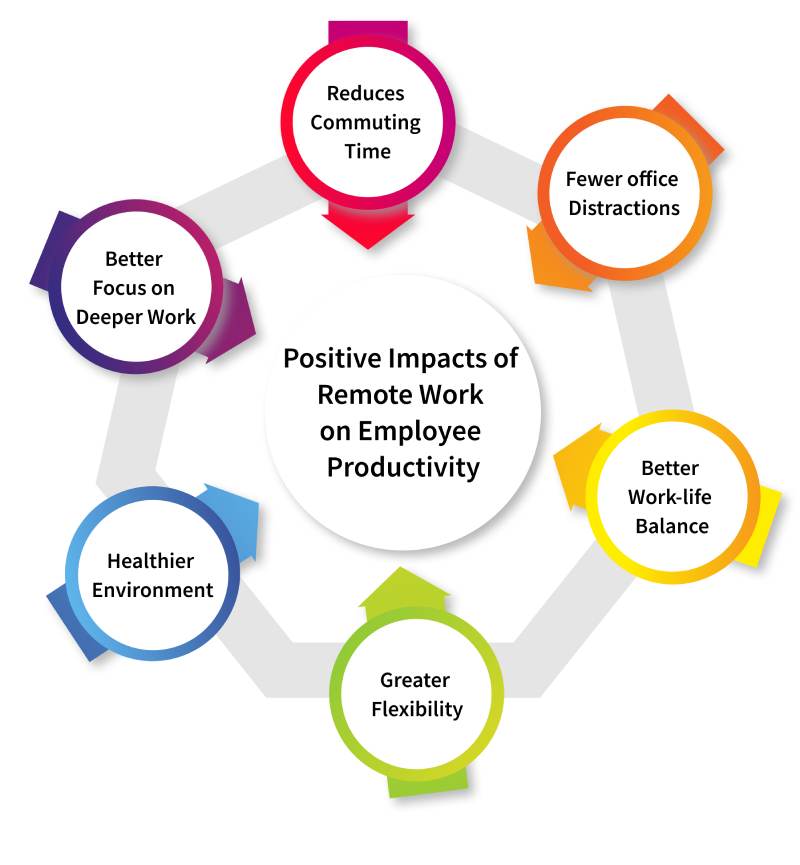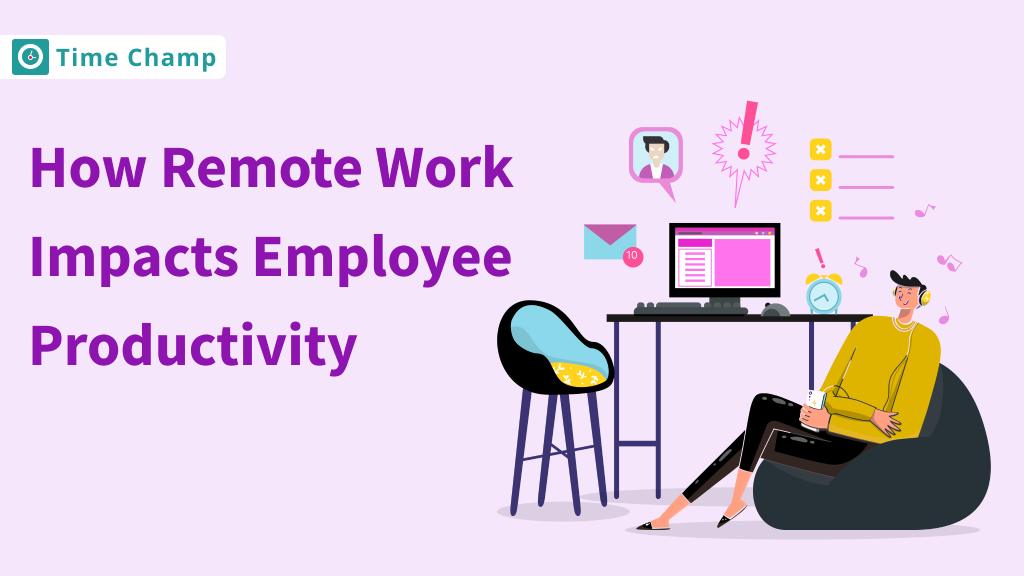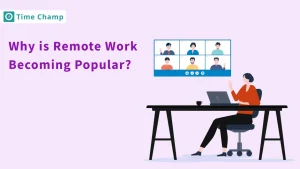As an HR manager, you’ve likely seen
how remote
work is transforming the
workplace. But the big question
remains: How does working from home
impact employee
productivity? Some employees
thrive with flexibility, while
others struggle to stay
focused.
In this blog, we’ll
explore how remote work affects
productivity, both the good and the
challenging sides. By the end,
you’ll have a better idea of how to
keep your team productive and
engaged in this new way of working,
and how to support them to do their
best. Let’s jump in!
Understanding Remote Work
Remote work has become the top choice
for many companies after the
pandemic. It’s not just about
saving office costs but also about
finding talented people from
anywhere in the world. This new way
of working focuses more on results
than time spent in the office. It
has completely changed how companies
think about work.
Remote work
is a flexible way of working where
employees do their jobs from a place
outside the regular office, often
from home or another location.
Usually, various tools will be used
to stay connected with the team and
communicate well. This setup allows
employees to work alone or with a
virtual team.
Employees
who work remotely can plan
their own schedules and work when
they feel most productive. Since
they handle their tasks on their own
without being closely monitored,
this helps to build trust between
you and your employees. Remote
work helps employees be more
creative because they can choose to
work in places where they feel
comfortable and focused. It also
allows businesses to work with
people from all over the world,
bringing together different ideas
and skills.
Positive Impacts of Remote Work on Employee Productivity

1. Reduces Commuting Time
Remote
work reduces the commuting
time of employees which essentially
improves
productivity.
Yes!
Eliminating long commutes from
employee’s day allows them to start
their work earlier and feel more
energized. It gives them more time
to focus on their work instead of
traveling. This extra time helps
them work better and improves
their work-life balance.
Spending less time commuting reduces
stress, anxiety, burnout and leads
to good mental health, and increases
job satisfaction. As a result,
employees feel more engaged and
effective during their work hours.
2. Fewer office Distractions
You may not believe it but it’s
true! Working
from home helps cut down on
office
distractions like surprise
meetings and unnecessary talks with
coworkers. This gives employees more
control over their time and helps
them focus better. They can also set
up their home office in a way that
feels good for them, like picking
comfy chairs, good lights, or a
quiet place to work.
This
personal setup can help them do
their jobs better than in a regular
office. With fewer interruptions,
people can stay on task and balance
work with their personal lives more
easily.
3. Better Work-life Balance
Rigid in-office schedules eliminate the concept of work-life balance but remote work isn’t like that. It allows employees to schedule their work day. They can pick which tasks to do first and take breaks when they need to, which helps them focus better and come up with new ideas. This freedom helps them adjust their hours more easily where they can spend their quality time with their family and friends. This happiness makes them more motivated and committed to their jobs, which improves how well they work and creates a friendly workplace.
4. Greater Flexibility
Isn’t it good to hear the word –
“Greater Flexibility”?
Remote
work offers greater
flexibility to employees which
improves their productivity
levels. Not every employee
likes to work in the morning, some
prefer to work at night while some
are quite the opposite to this.
This can’t happen at in-office
hours but this flexibility exists in
remote work. Employees can work at
their peak productivity (e.g., early
morning or late night) which helps
them to work better and increases
job satisfaction as well. This
flexibility is highly required for
tasks that need creativity and
deeper focus. This flexibility
allows employees to manage their
family commitments (parties,
gatherings, etc.) without
compromising work schedules.
5. Healthier Environment
Working from home can help employees
feel better mentally and physically.
They have more time to include
healthy habits in their day, like
exercising, eating good food, and
taking short breaks. These habits
can give them more energy and help
them focus better, which makes them
more productive.
Also, remote
employees usually take fewer
sick days because they are not
around as many germs from other
people. This helps them stay healthy
and keeps their work output high all
year long. In short, working
from home encourages a
healthier lifestyle, allowing
employees to do well in both their
personal and work lives.
6. Better Focus on Deeper Work
Remote workers often have more time to focus on important tasks that need a lot of focus. This kind of work is really important for doing a good job. Without a regular office schedule, employees can work at their own speed and take breaks whenever they want. This helps them feel better and ready to concentrate again. Also, being able to choose where they work helps them find a place that feels good and helps them get their work done. In simple terms, remote work helps people focus better and get more done by letting them manage their time in a way that works best for them.
Negative Impacts of Remote Work on Employee Productivity

1. Lack of Communication
Remote employees often have a hard
time communicating without
talking in person. This can cause
delays and misunderstandings,
especially when the topics are
tricky. They usually use emails and
messaging apps, but these written
messages can be unclear and easy to
get wrong.
Important messages
might get lost in email chains or
chat groups, which slows down the
processes and makes it harder to
finish tasks. Also, without any
face-to-face interaction can make it
tough to build relationships, which
are essential for working together.
2. Isolation and loneliness
One of the worst effects of remote work is that it can make employees feel isolated and lonely. Since there would be no direct interaction with any co-workers, they miss out on talking and connecting with others. This can make them feel disconnected from their organization and team. It becomes hard to make friends or even get help from others when working remotely. Even though video calls and messages help, they don’t feel the same as being with people face-to-face.
3. High Distractions
We know that remote workers don’t
have any office distractions but
what about home distractions? These
are more severe than office
distractions. Remote employees,
especially those with families or
roommates, often get interrupted. It
can be in the form of children,
pets, or other members in the house,
which makes it hard to focus on
work. Not everyone has a quiet place
to work. Some people may have to
work from uncomfortable places such
as a couch, etc. which makes it
difficult to concentrate on things.
To make it better, remote
workers should try to set up a
comfortable and quiet space to work
if they can. Reducing
home distractions and
talking to family or roommates about
setting boundaries can really help
them be more productive.
4. Risk of Burnout
Working from home can make people work longer hours than they should. When home and work are mixed together, some people feel like they always have to be busy. This can lead to too much work and feeling tired, which makes it hard to do a good job. Many remote employees skip breaks or don’t take a lunch, which can make them feel really tired and unable to concentrate. To stay healthy, prevent burnout, and do their best, it’s important for remote workers to set limits, take breaks, and make time to rest. Taking care of themselves helps them work better and not feel too tired.
5. Inequitable Work Experience
Not all remote workers have the same setup at home. Some have quiet and comfy places to work, while others have to deal with noise, bad tools, or slow internet. Additionally, remote employees might face proximity bias, where they feel they have fewer chances for promotions or praise than those working in the office. This can make them feel less motivated and hurt how well they work. To help everyone feel equal, companies should give help and resources to remote workers and make sure they have the same chances to grow as those in the office.
Generational Perspectives on Remote Work
Baby Boomers
Baby Boomers (born between 1946-1964) are used to working in offices with set hours, so working from home can be difficult for them. They like meeting people face-to-face and following a routine. This makes working from home feel lonely or confusing, especially with new technology. But many have slowly learned how to do it, especially those close to retirement who like the extra freedom. Most Boomers prefer hybrid work, so they can still see people and work well with their teams.
Gen X
Gen X (born between 1965-1980) is the “bridge” generation between the old and new ways of working, so they are better at remote work than Baby Boomers. They like working on their own and are open to flexible jobs. For many, working from home helps them handle both work and family life more easily.
Millennials
Millennials (born between 1981-1996) support remote work because they grew up with the internet and smartphones. They prefer to have the balance, freedom, and flexibility that remote work offers. For them, remote work isn’t just a nice thing—it’s something they expect. Since they’re used to online tools and communication, they do well in remote work environments.
Gen Z
Gen Z (born between 1997-2012) is the first generation of digital natives, as they are very comfortable with remote work technology. But because they don’t have much work experience, some find it hard to deal with feeling lonely, especially when it comes to getting guidance and growing in their careers. Many started working during or after the COVID-19 pandemic, so they think working from home is normal. Gen Z prefers hybrid work as they cares about learning and meeting people in person to connect and grow with others.
The Impact of Company Culture on Productivity in Remote Work
A strong company culture is important for helping remote teams get their work done. It keeps employees connected and working well together, even when they are far apart. When employees understand and believe in what their company stands for, they are more likely to work effectively and find it easier to do their work best. Open communication brings trust that opens lines in which everyone becomes free to present their ideas and cooperate with each other. Positive work culture allows for decision-making, to be more responsible and productive with the help of employee productivity tracking in remote work.
Creative Virtual Team-Building Activities
Team bonding is important to keep a friendly work environment, especially when people work in different places. Virtual team-building activities help employees get to know each other. These activities allow employees to have fun and make friends, which helps them work better. They also make work less boring and help employees feel more excited to do their jobs. Team-building games help them practice working as a team, so they do better on work tasks. When employees participate in these activities, they build good relationships with their team and are more likely to stay in the company.
Management’s Role
Leadership is very important for creating a good company culture and helping people work well from home. Good leaders can help employees feel more involved and do better by clearly explaining what everyone’s job is and what they need to do. Management should understand the problems their remote teams face and help them with productivity tools or training, so employees feel ready to do their best.
Final Thoughts
In conclusion, remote work has really changed how we do our jobs, and mostly for the better. It allows people to work from home and saves a lot of time on travel, better work-life balance, etc. But it can also make some employees feel lonely and make it hard to communicate. If companies understand how different age groups handle remote work, they can find ways to make it better for everyone. When companies focus on these things, they can create a great remote work experience for everyone.
Keep your team productive, wherever they work—use Time Champ, the employee productivity software built for success!
Signup for FreeBook DemoFrequently Asked Questions
Companies can highlight how much work remote employees complete, following the progress of projects, and getting feedback during regular meetings. By using tools to keep track of tasks and set clear goals, organizations can measure performance without having to watch them all the time.
There are many tools that can help remote teams work together better. Using project management tools like Trello and Asana, communication tools like Slack and Microsoft Teams, and using video call apps like Zoom and Google Meet can help teams work together and communicate easier.
To help new remote workers start, companies can make a simple plan that includes online introductions, giving access to needed tools and resources, explaining what their job is, and setting up regular check-ins to answer any questions they have.
Businesses can make sure everyone is treated equally by giving all workers the same tools and support, being open about chances to grow, hiring people from different backgrounds, and creating a workplace where everyone’s opinions are respected. This can be done by praising hard work and asking for feedback often.






